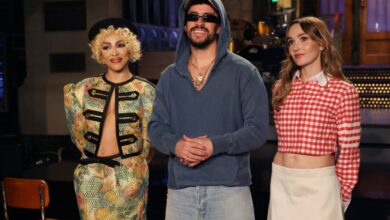‘Patriots’ Theater Review: Michael Stuhlbarg Stars in Peter Morgan’s Chronicle of Russian Oligarchs Who Fueled Putin’s Rise
Peter Morgan’s new play Patriots, now on Broadway, opens with an awareness of its audience. “In the West you have no idea,” Boris Berezovksy (an excellent Michael Stuhlbarg) says through a voiceover. “You think of Russia as a cold, bleak place, full of hardship and cruelty.” The stage is bare, and the oligarch, who played an instrumental role in Vladimir Putin’s rise to power, speaks to us from a liminal space. He goes on to describe the beauty of his country, Russian music, the sounds of children laughing in the streets and the taste of ice cream on a cold day.
When the stage comes into view (set design by Miriam Buether, lighting design by Jack Knowles), it’s 1955. Berezovsky is a schoolboy gifted in mathematics. A teacher urges his parents — congenial and full of quips — to push their son. “Anyone can be a doctor, Mrs. Berezovsky,” says the teacher played by Jeff Biehl, as if pleading. “Only the elite can be a mathematician. It’s like entering the gates of heaven.”
Berezovsky does become an elite, although not in the way his teacher imagined. (The gates through which he enters look awfully hellish.) Morgan zips 40 years into the future, where Berezovsky has made a fortune by pouncing on and exploiting small-business legal loopholes in the waning years of the Soviet Union. With his riches, the Russian entrepreneur turns to politics and media: He buys the country’s main television channel and bribes elected officials to do his bidding. Berezovsky insists that his actions are for the good of the country, cleverly framing his greed as evidence of national loyalty.
Patriots isn’t as nefarious as its protagonist, but it operates with a similar slipperiness. Morgan’s work, co-produced by Netflix in the streamer’s first Broadway foray, maps a morality play onto its portrait of betrayal while also sketching Putin’s rise to power. (There’s a universe where this show, with its broad subject matter, might have worked better as a television series akin to Morgan’s Netflix powerhouse The Crown.) But Patriots, directed by Rupert Goold, is at its most narratively and politically compelling when it investigates betrayal, a terrain that allows Morgan to build out Berezovsky’s inner life and help us understand the oligarch’s relationships to Putin (a chilling Will Keen) and Roman Abramovich, a younger Russian entrepreneur played by an assured Luke Thallon.
The ties among these three men anchor Patriots, which otherwise can sometimes feel too unwieldy in its ambitions. Through Berezovsky, Putin and Abramovic, Morgan crafts a kinetic and gripping story of politics as a proxy war for the rich, powerful and egotistical. Patriots kicks off with Berezovsky sitting in the office of his night club, Logovaz, a hedonic den and watering hole for the country’s oligarchs. Stuhlbarg exhilarates from the start. He plays up Berezovsky’s quick wit and general irascibility, roaring commands at his assistant (Nick Rehberger) while juggling phone calls from ex-wife (Camila Canó-Flaviá), his new girl (Marianna Gailus), Putin (who at the time is deputy mayor of St. Petersburg) and Abramovich, an eager businessman whom he calls “the kid.” Sitting at a desk perched on a raised part of the stage, Berezovsky resembles a king.
Much of Patriots’ sluggish first act chronicles this royal’s slick maneuverings in Russia. Morgan deploys some awkward exposition to orient audiences whose knowledge of the mammoth Eastern European nation might not amount to more than a handful of recent headlines. Berezovsky’s dealings with an initially wide-eyed Abramovich, a straight-edged Putin and some smart uses of news broadcast programming lay out the Russian political landscape of the late 90s. The historical groundwork connects Patriots to the present day, giving viewers a rudimentary sense of the circumstances and forces that thrust Putin into his presidency. What led him to become an authoritarian ruler is more shakily handled.
Tucked among these diplomatic affairs are tender flashbacks of Berezovsky with his old math professor (a sharp Ronald Guttman), who worried that his pupil’s insatiable desire for more might lead to his ruin. These memories reveal the scale of the oligarch’s ambition: He was never going to be satisfied leading a quiet academic life.
That Berezovsky’s fate takes a Shakespearean turn in Patriots’ more energetic second act is unsurprising. Morgan’s play, from its opening moments, looks West. After Putin becomes president, he abandons the cadre of businessmen who helped catapult him to power. The former KGB intelligence officer, whom Keen initially plays with a slight meekness, transforms into a steely and ruthless politician. A furious Berezovsky launches a campaign against Putin, whom he repeatedly describes as a “nobody.” The battle waged is a losing one for our capricious oligarch, who is subsequently abandoned by Abramovich and forced into exile.
When Patriots closes in on the three principal characters, whose distance from each other on the stage mirrors the increasing chasm between them, the results are jolting and, ironically, topical. With the egos of the rich at the center, money becomes a tool and politics little more than a stage where loyalties are tested and charges of betrayal are levied.
Venue: Ethel Barrymore Theatre, New York
Cast: Michael Stuhlbarg, Will Keen, Luke Thallon, Stella Baker, Ronald Guttman, Alex Hurt, Rosie Benton, Jeff Biehl, Peter Bradbury, Camila Canó-Flaviá, Marianna Gailus, Paul Kynman, Adam Poss, Nick Rehberger, Benjamin Bonenfant, Danielle Chaves, Joe Forbrich, Tony Ward
Playwright: Peter Morgan
Director: Rupert Goold
Set designer: Miriam Buether
Costume designer: Deborah Andrews, Miriam Buether
Lighting designer: Jack Knowles
Sound designer & composer: Adam Cork
Presented by Sonia Friedman Productions, Netflix, Nederlander Presentations, Richard Winkler, Stephanie P. McClelland, Ted Snowdon, Jamie DeRoy/Ken & Rande Greiner, Richard Batchelder, TT Partners (Executive Producers)


